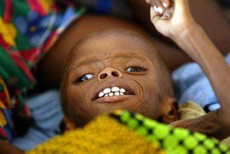|
Niger Decries "Trickle" of Global Aid: Report
 |
|
A
villager unloads emergency supplies from the WFP. (Reuters)
|
CAIRO,
August 17, 2005 (IslamOnline.net) – Villagers and local officials in
the famine-stricken African country of Niger decried Wednesday, August
17, the trickle of the already overdue global aid to alleviate the
worst spell of hunger in recent history, a leading US newspaper
reported.
"We
always are hearing, 'They have given something, they have given
something.' But on the ground, we have not seen it yet," Issufu
Ibrahim, chief of one of the hardest-hit villages, told The
Washington Post.
He
said aside from three sacks of grain that arrived from neighboring
Nigeria, his village of 500 families has seen no evidence that a
massive international aid effort is underway.
"We
are crying, why are they not giving to us? Why are they not giving to
us? Our children are dying," he added desperately.
Drought
and severe locust invasion last year left some 3.6 million people in
this country of 11.7 million faced with severe food shortages.
Children
in Niger, the second-poorest country in the world, are most at risk,
with some 800,000 aged under five need to be fed urgently.
Belka
Garba, governor of Maradi state in south-central Niger, one of the
most severely affected areas, told the US daily there was little
evidence of the UN food program providing meaningful aid.
"If
I talk of them helping people, I would say they have failed in the
region," he told The Washington Post.
The
United Nations has warned that mass hunger was bearing down on
millions of people in Niger, saying it was still $34.4 million short
of its latest fund-raising goal.
Although
the hunger crisis was brewing for many months, it was not until the
BBC aired several dramatic reports from the country in July that major
donations began to pour in.
“Failed
System”
Aid
workers and analysts said that the reason behind the overdue aid has
more to do with miscalculation and hesitation by the international aid
bureaucracy, which initially underestimated the severity of the
crisis, than with reluctance of the world to pitch in.
"This
is not a story of donors being mean," Paul Harvey of the Overseas
Development Institute, a research group based in London, told the Post.
"This
is a story of a failed system."
On
August 9, large-scale distribution of emergency rations to hungry
families in Niger began for the first time since the United Nations
called for aid late last year.
"This
emergency response came late -- very, very, very late -- if not too
late for some of the children," Johanne Sekkenes, the top
official in Niger for Doctors Without Borders, an international
medical aid group, told the daily.
The
UN World Food Program receives more than $2 billion a year, but most
of that is restricted by donors for use in specific countries or
regions, leaving little for emergencies.
James
Morris, the program's executive director, told the Post that a
series of recent withdrawals for Niger, made after the rush of media
attention, has left the emergency fund dangerously low, at just $26
million.
"It
went virtually unnoticed for a good many months" in Niger, said
Morris, adding that last winter and spring, world attention was
focused on the humanitarian crisis caused by the tsunami in South
Asia.
"People
do get preoccupied by the high-profile emergencies."
Dying
Babies
 |
|
A
severely malnourished infant awaits help at an emergency feeding
center. (Reuters)
|
Many
parents across the country continued burying their children, the daily
said.
Last
Wednesday, year-old Fassoma Abdoulsalam died after weeks of being
sick.
She
vomited; she had diarrhea; her hair turned dark orange. These signs of
chronic hunger were nothing new to her parents, who said their six
other children had died in earlier lean times.
"We
heard on the radio that organizations are giving food," said her
father, Abdoulsalam Bukari, "but it's not here."
Two
hours after Fassoma's death, her parents laid her shriveled body
inside a hole in the ground and covered it with dirt, the paper said.
"They
placed freshly cut branches on top to ward off hungry animals.
"About
a foot away from the baby's grave is another dirt mound, then another
and another.
"But
they are harder to see. It is rainy season now, and the storms have
already begun washing the tiny graves away."
|